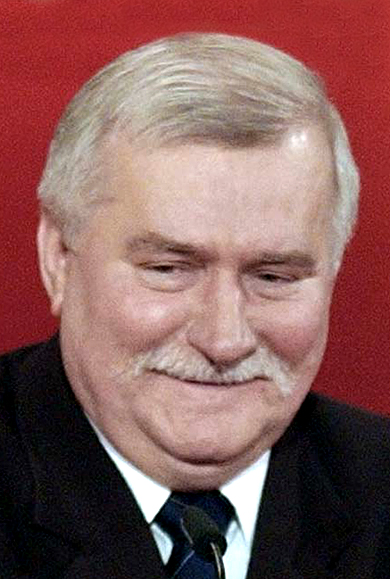 Former Polish president Lech Wałęsa has said he is not going to retract his remarks in which he called the current president Lech Kaczynski ‘an imbecile’. Other reports have Wałęsa calling him an idiot, blockhead and a fool.*
Former Polish president Lech Wałęsa has said he is not going to retract his remarks in which he called the current president Lech Kaczynski ‘an imbecile’. Other reports have Wałęsa calling him an idiot, blockhead and a fool.* "I felt Lech Walesa's statement overstepped the bounds of permissible criticism of the head of state and was meant solely to malign the president," PAP news agency quoted member of parliament Jolanta Szczypinska as saying.
I guess what they really meant to say was that Walesa stepped over the line.
 Poland is not the only place where politicians use defamation suits to silence critics. The government of Singapore is notorious for suing critics into jail or bankruptcy or otherwise out of political existence. Thailand's politicians are also keen to resorting to defamation charges where they can.
Poland is not the only place where politicians use defamation suits to silence critics. The government of Singapore is notorious for suing critics into jail or bankruptcy or otherwise out of political existence. Thailand's politicians are also keen to resorting to defamation charges where they can.Even if they don't win their case, the costs of legal defence can be crippling.
In Poland, Thailand and Singapore, these defamation actions are pursued as criminal offences where jail time can and have been imposed on top of any monetary damages. In Poland, for example, you can go to prison for 3 years if you insult the head of state.
In Canada, defamation tends to be a civil matter where the worse that can happen is the award of monetary damages. That must be a great relief to some.
Defamation actions between politicians tend to be confined to nations where the democratic system is weak, disreputable or immature. Rarely do you see these actions in western mature democracies but while it can happen, these cases tend to be thrown out pretty early in the game because the benefit of the doubt is given to fair comment.
You see, in most mature western democracies, politicians learn that fair comment and the public interest in critical speech trumps any feeling of personal annoyance they might feel for getting called out. While they may publicly respond to charges in a clear and unequivocal manner, in the end they understand and accept that the true measure of their standing in the long run will not be the decision of a court judge but in the will of the electorate.
---------------------------
*I assume they were all the same incident but simply translated differently. Makes you admire what a colourful language Polish can be.










No comments:
Post a Comment